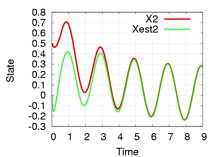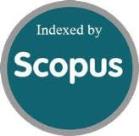A Point Memory State Observer with Adjustable Parameters for a Class of Uncertain Linear Systems with State Delays
Keywords:
point memory robust state observer, time-varying adjustable parameters, state delays, LMIsAbstract
In this paper, we present a point memory robust state observer with time-varying adjustable parameters for a class of uncertain linear systems with state delays. The point memory robust state observer proposed in this paper consists of fixed observer gain matrices and time-varying adjustable parameters, which are determined by updating rules. Sufficient conditions for the existence of the proposed point memory robust state observer can be reduced to solvability of LMIs. Finally, simple numerical examples are included to illustrate the effectiveness of the proposed robust state observer.
References
K. Gu, V. L. Kharitonov, and J. Chen, “Stability of time-delay systems,” Birkhauser, 2003.
T. Kubo, “LQ regulator of systems with time-delay in the states by the point memory feedback,” IEICE Trans.
Fundamentals of Electronics, Communications and Computer Sciences, vol. J87-A, no. 4, pp. 577-579, 2004.
X. Li and C. E. D. Souza, “Delay-dependent robust stability and stabilization of uncertain linear delay systems: a linear matrix inequality approach,” IEEE Transactions on Automatic Control, vol. 42, no. 8, pp. 1144-1148, August 1997.
X. Li and C. E. D. Souza, “Criteria for robust stability and stabilization of uncertain linear systems with state delay,” Automatica, vol. 33, no. 9, pp. 1657-1662, September 1997.
L. Yu and J. Chu, “An LMI approach to guaranteed cost control of linear uncertain time delay systems,” Automatica, vol. 35, no. 6, pp. 1155-1159, June 1999.
K. Endo, H. Oya, T. Kubo, and T. Matsuki, “Synthesis of variable gain robust controllers based on point memory LQ regulator for a class of uncertain time-delay systems,” 2015 10th Asian Control Conference, IEEE Press, pp. 2957-2961, September 2015.
M. Norton, “Modern control engineering,” Pergamon Press, 1972.
B. D. O. Anderson and J. B. Moore, “Optimal control-linear quadratic method,” Prentice Hall, 1990.
D. G. Luenberger, “Observing the state of a linear system,” IEEE Transactions on Military Electronics, vol. 8, no. 2, pp. 74-80, 1964.
D. G. Luenberger, “Observer for multivariable systems,” IEEE Transactions on Automatic Control, vol. 11, no. 2, pp. 190-197, April 1966.
B. Gopinath, “On the control of linear multiple input-output systems,” The Bell System Technical Journal, vol. 50, no. 3, pp. 1063-1081, 1971.
J. C. Doyle and G. Stein, “Robustness with observers,” IEEE Transactions on Automatic Control, vol. 24, no. 4, pp. 607-611, 1979.
B. L. Walcott and S. H. Zak, “Observation of dynamical systems in the presence of bounded nonlinearities/uncertainties,” 25th IEEE Conference on Decision and Control, IEEE Press, April 2007.
S. D. Wang, T. S. Kuo, and C. F. Hsu, “Optimal-observer design for linear dynamical systems with uncertain parameters,” International Journal of Control, vol. 45, no. 2, pp. 701-711, March 2007.
D. W. Gu and F. W. Poon, “A robust state observer scheme,” IEEE Transactions on Automatic Control, vol. 46, no. 12, pp. 1958-1963, December 2001.
M. Boutayab and M. Darouach, “Comments of a robust state observer scheme,” IEEE Transactions on Automatic Control, vol. 48, no. 7, pp. 1292-1293, 2003.
D. W. Gu and F. W. Poon, “Authors’ reply,” IEEE Transactions on Automatic Control, vol. 48, no. 7, p. 1293, 2003.
S. Boyd, L. E. Ghaoui, E. Feron, and V. Balakrishnan, “Linear matrix inequalities in system and control theory,” SIAM, 1994.
M. Maki and K. Hagino, “Robust control with adaptation mechanism for improving transient behaviour,” International Journal of Control, vol. 72, no. 13, pp. 1218-1226, 1999.

Published
How to Cite
Issue
Section
License
Submission of a manuscript implies: that the work described has not been published before that it is not under consideration for publication elsewhere; that if and when the manuscript is accepted for publication. Authors can retain copyright of their article with no restrictions. Also, author can post the final, peer-reviewed manuscript version (postprint) to any repository or website.

Since Oct. 01, 2015, PETI will publish new articles with Creative Commons Attribution Non-Commercial License, under The Creative Commons Attribution Non-Commercial 4.0 International (CC BY-NC 4.0) License.
The Creative Commons Attribution Non-Commercial (CC-BY-NC) License permits use, distribution and reproduction in any medium, provided the original work is properly cited and is not used for commercial purposes



